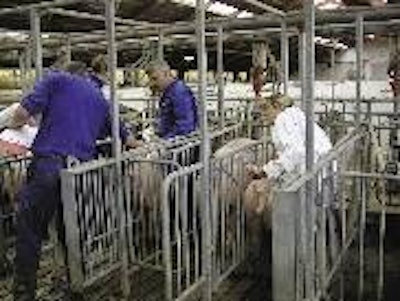
Six people who travelled to Denmark from Serbia earlier this year have become the first graduates of a novel Danish programme specially conceived to train foreign pig-farm managers. The opening course was considered such a success that plans have been made already to repeat it for new participants in March 2008, so helping to meet the demand for skilled personnel to manage the fast-increasing number of pork projects in the countries of central and eastern Europe.
The first to complete the 6-months course and receive their diplomas from the Danish minister of agriculture were employees of Serbian agribusiness company Delta Agrar. Delta Agrar has about 6000 sows and its interests extend to slaughterhouses and retail stores.
Denmark-based training for its farm managers began in March 2007 with 7 weeks of theory at Bygholm Agricultural College, instruction arranged in 6 modules of about one week each. Afterwards they went on to receive 6 modules of practical training on large farms — each of these modules lasting about 4 weeks.
Every module finished with a test. There was also a final examination at the end of the course in which the student was asked to demonstrate what he or she had learned by presenting not only a complete description of the pig unit where they did their training, but also an analysis of its management strategy with action-plan suggestions for possible changes or improvements.
"Our objective has been to show the trainees that practice, instruction and leadership go hand in hand in modern pig management. In other words management is not done from an office!" comments Bjarne Kornbek Pedersen, general manager of Danish Farm Design A/S. The company, which specialises in the development and design of large pig units, training of farm managers and international management support, originated the course in association with Bygholm College.
"You may know all the theory in the world about pig production," he continues, "but if you cannot demonstrate it or motivate your staff to do the right thing then it is completely useless. Therefore our courses comprise a mixture of farm management procedures and modern human resource management. That includes personal profile testing, which helps the manager to understand what attributes to look for when creating an efficient team."
Project plans neglect staffing
Many new large pig enterprises have been built in eastern Europe and more are planned, Bjarne remarks. But the investors often spend millions of dollars on new technology and modern breeds while forgetting the importance of finding the right people to manage the farm and the animals.
"It is frustrating to observe how often the question of staffing is neglected. Yet the personnel on the farm are its key factor for success in pig production. Well-trained people are the catalyst that allows all the technical and biological inputs to produce the expected output.
"Early on, we saw that as an opportunity for our company. Danish Farm Design started its management activities 2 years ago by providing highly skilled managers who would be able to support pig producers and owners of units outside Denmark. Our concept has been to hire experienced managers and place them abroad in large pig units where they can organise and train the local staff and report to the owners."
These delegated managers posted to other parts of Europe have a back-up service, he points out. The company maintains a team of what it calls super-managers in Denmark who communicate with the people abroad by e-mail and Internet. Because web-based FarmManager software is used for organising staff and working routines, the Danish supervisors can follow up easily on the Internet to find what progress is being made. Further checks are made in person as the super-managers make regular visits to clients' farms.
"The same idea is now also being implemented in herds in Denmark," Bjarne reports. "Here, we provide support to the local pig-farm manager and assist him such as in setting up long-term goals and problem-solving. In reality we are just applying some of the same procedures to the management of farms as have been used in other industries for many years. Adding the training and education package for future managers from other countries was just the logical next step in our activities."PIGI

















